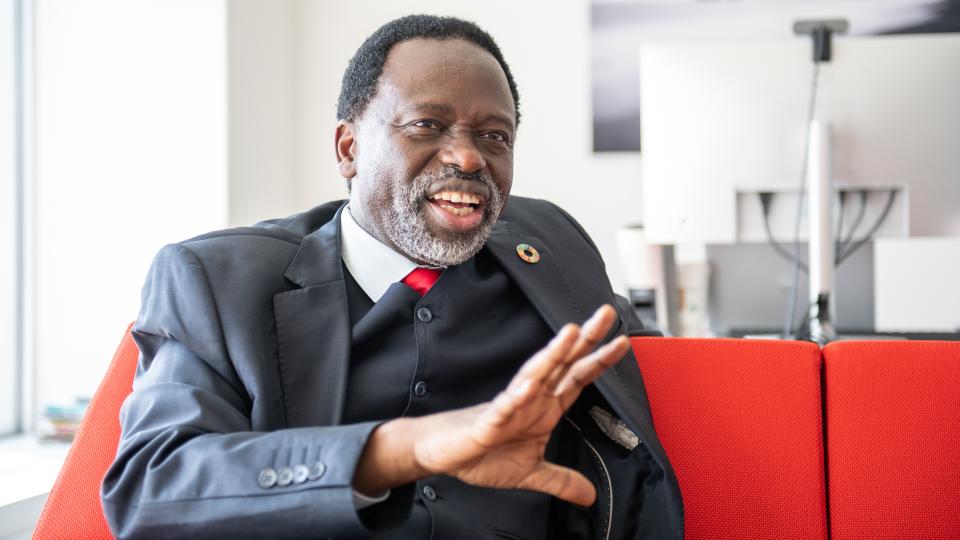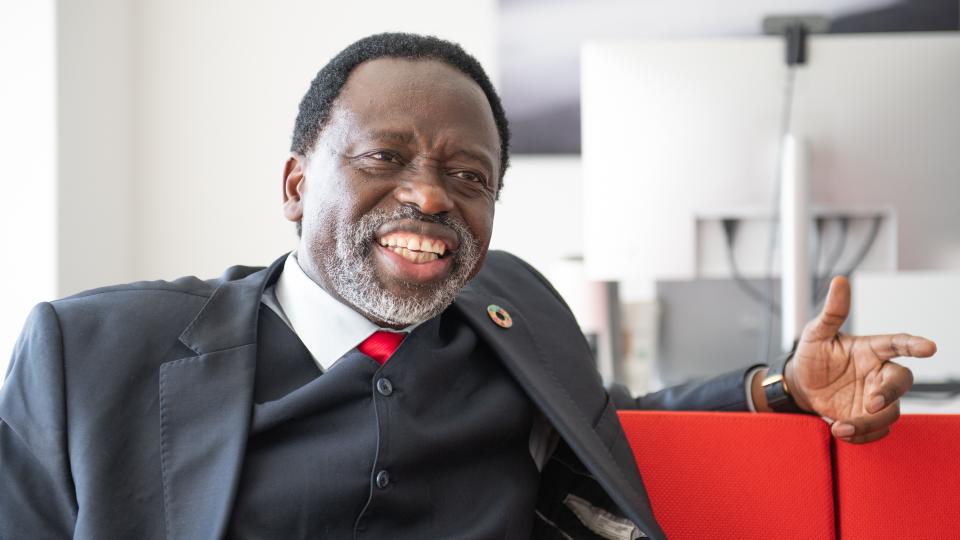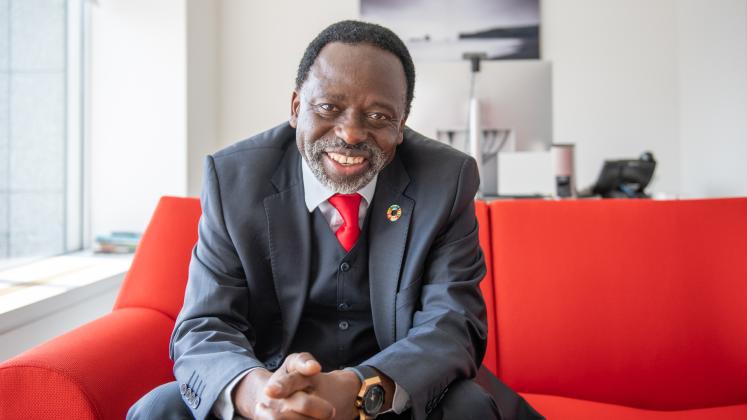How did your experiences growing up in rural South Africa and studying abroad shape your career and your outlook on global development challenges?
I am from the part of South Africa called Venda, which is the only place in the world where they speak Venda. Venda is a Bantu language, which is basically a group of languages that are spoken from South Africa all the way to Kenya. It's part of the Niger Congo branch of languages.
Venda is different from the rest of South Africa because it is probably the least Westernized for many reasons — mainly because of malaria.
The last conquest battles were fought in that part of the world and the ruling classes of Venda were the last people to be subjugated — much, much later. And that shaped me and my outlook on life.
I always felt like I was an outsider in South Africa. And the reason for that is because when you go to Johannesburg the first question that people ask you is, “Where are you from?” And I would say, “I am from Venda.” And then they would ask, “Is that part of South Africa?” Obviously, things have changed quite a bit since then.
I was brought up by a very, very strong family. My parents were teachers. But the place where we lived was owned by my maternal grandparents and we lived with them until they both passed away.
Before I left Venda, I took a trip to England, which was a big cultural shock.
I was seventeen and I passed through Johannesburg for the first time. It was my first time on an airplane. I arrived in England in 1989 to attend an international science fair. And it was the first time I encountered Americans and the American accent. Of course, now with access to global television and so on, the American accent is not so foreign anymore.
But for me at that time it was a foreign accent because in the 1980s there was very little access to television [in Venda]. And if there was the odd time you watched television it would be in the local language — an American show being interpreted into the local language. I'm sure if we had ever had the privilege of meeting any of the actors, we would have been surprised they did not speak our language because it almost seemed like they could.
Going to England was a defining moment in many ways. First, it was just a few weeks before the fall of the Berlin Wall. It was at the tail end of the Cold War. And it was perhaps the beginning of a transition in South Africa because England had many South African exiles.
It was quite clear that we were on the precipice of change, which we could see and hear. When I went to Trafalgar Square, there were protests outside the South African embassy about the change. I guess that was my first view of the world and that is what gave me the idea to consider studying outside South Africa.

I spent six months in Cape Town and then I was told that I'm going to study in Ohio — Cleveland, Ohio. I had never heard of Ohio. I had never heard of Cleveland. I had never heard of Case Western Reserve University. I just packed my bags and left South Africa for the United States. And they told me they would give me three plane tickets — one going in, one coming out, and one if somebody in my family died. But only one, so I would have to choose wisely.
I studied mechanical engineering. I must have been 19 years old when I arrived in Ohio and I stayed in Ohio for four years.
And maybe just to talk about my experiences in the United States — what lessons did I learn? Cleveland was quite international at that time. Cleveland is a post-industrial city with all the effects of industrialization, whether it is in the form of pollution or in the form of abundant infrastructure such as warehouses. And obviously the social, political and economic consequences of that.
I once wrote an article about going to a UB40 concert at a warehouse in Cleveland. It must have been an old steel warehouse. And I couldn't help but notice the irony of the unemployment that resulted from the fall of the steel industry and the name UB40, because UB40 is actually the name of an unemployment benefit form in the UK — which is also indicative of the impact of deindustrialization on society and people. I saw it with my own eyes, and it was an eye opener.
Understanding the impacts of industries on society should not be an afterthought. It should be part of doing business and being a responsible business.
One lesson I learned was that industrialization brings many good things, but there are negative things that it has left in its wake. And in the next stage of industrialization, issues of the environment must be at the forefront. Understanding the impacts of industries on society should not be an afterthought. It should be part of doing business and being a responsible business.
When I left the US and went back to South Africa, South Africa had just gone through a transition. There was a new government. I had to get a South African ID, which I did not have.
And some people were saying, “Hey, you ran away during the most formidable time of our transition and you are back to reap the fruits of our labour.”
But revolutions happen in many forms. Education is important if you are transforming society.
So, I came back to South Africa, worked for six months, and went to study again at the University of Pretoria for another 1 1/2 years. And then I took off again to go to England and do a PhD. I did a PhD in artificial intelligence (AI), but at the beginning I did not know what I was going to do my PhD on. I spent a lot of time trying to figure that out, asking myself, “If I'm going to be a useful instrument for development of South Africa, what career path should I take?” Ultimately, I decided to do a PhD in AI. I was at St. John's College (University of Cambridge) — a beautiful college, but it was a bit of a cultural shock going to the dining hall wearing an academic gown.
The United Kingdom is an interesting place for a South African. Historically, many of the significant figures in British politics were associated with South Africa. Benjamin Disraeli lost an election because of British losses during the Zulu War. Winston Churchill was a prisoner of war in South Africa when he was still a journalist. When Mahatma Gandhi left England, he came to South Africa. And then, ultimately, he went to India to lead the independence movement. And Jan Smuts, the Prime Minister of South Africa who was instrumental in the formation of the United Nations, was at one stage in the war cabinet of David Lloyd George and was also the Chancellor of University of Cambridge.
So, there's so much connectivity between South Africa and England. And obviously the politics can be very complicated. But the connectivity is good.
I was at St. John’s for three years and I completed a PhD. And then I started my academic career in London at Imperial College.
But I couldn't wait to go back to South Africa, so again I packed my bags and I left England. And for the past 22 years I was living in South Africa.
You completed a PhD in artificial intelligence decades before it was a prevailing topic. What led you to be an AI researcher?
Well, artificial intelligence is actually an old term. It was coined in the United States by John McCarthy in the 1950s.
To be honest with you, it was quite a simple decision to study AI. I did not know what I was going to work on, but I was sitting next to Nando de Freitas who is now an AI researcher at Google DeepMind — we did PhDs at the same time — and I said, “What are you doing a PhD on, Nando?” And he said, “artificial intelligence.” It sounded like something that was interesting. It's as simple as that.
And from a technology perspective, the AI concepts were familiar — we had studied them in statistics. Optimization — we had studied it in engineering. So, it was not like going into a new field. And in many ways, it sounded like an easier field at that time, because with AI you don’t necessarily have to understand the physics of what you are studying. You just have to understand the data and so on.
I worked on neural networks. Nobody really uses the term neural networks anymore. If you talk about deep learning, it's a neural network. It's a big neural network inspired by the biological brain.
How do you view the current trajectory of technology and its role in sustainable development?
If you look at issues of education, technology is key. In rural schools, where qualified teachers are not available, can't we use online platforms to teach and bring education where there is no capacity? Can't we connect people to rural schools?
And technology is central in achieving gender equality. How does technology reinforce some of the biases that we observe? For example, I was reading about a big US company that had a résumé sorting algorithm that was discriminating against women.
There are advantages and disadvantages of technology. But the advantage of technology is that it is much easier to fix the technology than to fix the human.

Another important issue is connectivity. For example, I am a farmer. I raise chickens, cattle and goats. I grow maize and watermelons. But there is nothing that has humbled me more than being a farmer. Just walking my farm, I feel so vulnerable because there's no connectivity. We are afraid of snakes in the part of the world where I come from — black mambas, puff adders. We see them and I aways think, "If I'm bitten by one, how do I get help within an hour?" Because anything outside of that and you are no longer alive.
Some farmers in South Africa have 500 hectares. There is no way someone is going to come and put connectivity out there for one farm owner and a few of the workers. So, the issues of connectivity and access to digital infrastructure are very important.
And where does the United Nations University come in? And where lies the gap? The gap that I see, certainly from the experience of where I come from, is that the people who make laws don't sufficiently understand technology. The United Nations University must offer a platform to help policymakers understand some of these issues that we need to legislate. Some of these issues are evolving, which means adaptive legislation becomes even more important — being able to understand how things are going to evolve over the course of a year or a given period.
Who have been, or currently are, mentors in your life? Who has inspired you?
I've had great teachers. I never ran short of good role models in my family and in my community when I was growing up. And I’m sad that many of those people are gone.
My grandmother was definitely a big inspiration and mentor for me. She was a very influential person in my life. She could not read or write, but she was a very wise person. When I was in Johannesburg, whenever I got angry, I used to say to myself, “You know, if my grandmother was here, she would give me much better advice than what I'm getting.” And all these educated people around me did not quite appreciate that my grandmother, who could not read or write, was quite a wise person.
When I would go visit my aunt with my grandmother, we would walk about six kilometres. We would go over the mountain and cross a river and my grandmother would say, “You see how the river has veins? If you see veins in the river, you do not cross because the water is strong and you could be washed away!”
My grandmother was my first engineering teacher. She used to make clay pots and she would knock on them and listen to the sound and tell me, “If it rings for a long time, it is a good pot. If it rings for a short time, it is not.” She was really a very good engineer.
What are your hobbies?
One is being a farmer. And a second one, I like going home to Venda even though it's not my current home. Physically, that's where I grew up, but it's a different place than it used to be. I think the population must have quadrupled, if not more. Places that we used to go — where it was just forest — are now populated. I really like going back and seeing those places and just walking some of the paths.
What are you and your family most looking forward to for your new life in Japan?
It's a new experience which is going to be valuable. It's going to change my family and that is good. They have never really lived outside South Africa, but they are well-travelled. They have taken holidays in Florida, the Middle East, Europe and the rest of the African continent. So, I think they will like it. And I hope they will learn how to speak Japanese.
They are under no illusion that it is going to be a smooth experience because new experiences are difficult. You know, when I first went to the United States I went through all the stages of adapting. I have not yet felt those stages in Japan. I suppose part of the reason is because I have been so 'on the road'.
What advice would you give to youth today?
My advice is that the world is big and you need to learn it in its totality. I've often talked about the Global South and the Global North. I don't think those distinctions should exist in 200 years. We should bridge whatever divides us, at least in the next 200 years. So, it is very important that youth understand that the world is bigger and that we are all interconnected. I don't think I can emphasize that enough.
The COVID-19 experience has shown us that a problem neglected in one part of the world can easily be a problem for all of us. And you cannot completely close yourself off from the rest of the world. As a result, international organizations such as the United Nations are important — organizations that think at a level that is bigger than just an individual member state. These organizations are made of individual member states, but they take on issues of our common interest — issues of peace, issues of climate, issues of bridging the digital divide, issues of development. These are very, very important issues and young people must always understand that these are shared challenges.



